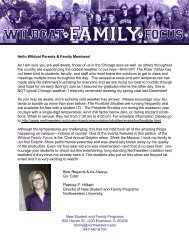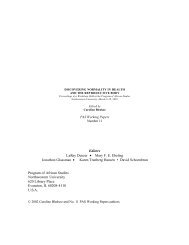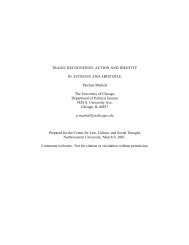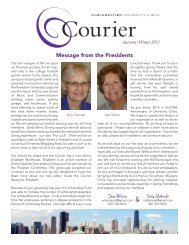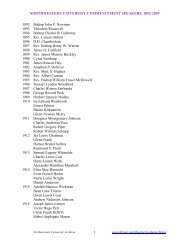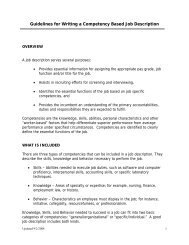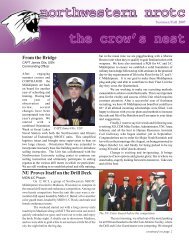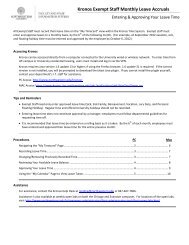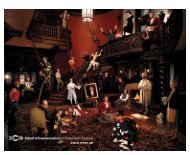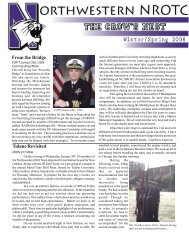Artistry Permits and Custom May Ordain - Northwestern University
Artistry Permits and Custom May Ordain - Northwestern University
Artistry Permits and Custom May Ordain - Northwestern University
Create successful ePaper yourself
Turn your PDF publications into a flip-book with our unique Google optimized e-Paper software.
in Economic Anthropology. 4 (1981): 3-12.<br />
257 De Barros, Da Asia, 1:liv. 7, cap. 4.<br />
258 Pate Chronicle, Heepe <strong>and</strong> Stig<strong>and</strong> versions.<br />
52<br />
threats to official power. Ungwana could still ascend to the office of sultan by virtue of<br />
their access to <strong>and</strong> trade in cloth <strong>and</strong> other prestige-value materials. The History of Kilwa<br />
records various incipient disputes over authority in the fifteenth century, <strong>and</strong> it is clear<br />
that sultan(a)s were generally unable to hold power for more than a few years. Kilwa<br />
accumulated immense wealth, in de Barros’s words, “after becoming the sovereign of the<br />
mine of Sofala;” but such wealth circulation, even when restricted, pluralized access to<br />
accumulation <strong>and</strong> resulted in the “divisions” which, de Barros noted, “arose upon the<br />
death of some of its kings.” 257<br />
One of the best examples of material manipulation serving as a means to power is<br />
the case of the sultan’s poor treatment of Mwana Darini of Pate, the wife of a wealthy<br />
merchant. The Pate Chronicle records that the use of the siwa—a symbol essential to<br />
sustain any credible aspiration to political power—was disallowed at the circumcision of<br />
Mwana Darini’s son. As a result, she <strong>and</strong> her followers invested considerable wealth to<br />
construct a new horn. This new <strong>and</strong> more aesthetically pleasing siwa was played for the<br />
town on a festival day, embarrassing the sultan <strong>and</strong> diverting local power to Mwana<br />
Darini’s son <strong>and</strong> to those who funded the creation of the horn. Thus the son of a<br />
deported merchant-elite gained office because his mother, fully aware of the metaphorical<br />
power of the siwa, skillfully manipulated a prestige-value material. 258<br />
The elite <strong>and</strong> the state struggled over power <strong>and</strong> its requisite access to stores of<br />
cloth <strong>and</strong> other valuables. The elites’s capacity for high consumption diluted the sultan’s<br />
power. Indeed, a figurehead was in deep political jeopardy if channels of material access<br />
<strong>and</strong> exchange were closed. Moreover, those who profited by evading state taxes <strong>and</strong><br />
customs could set themselves up as “new” rulers elsewhere. Such subversive behavior<br />
exp<strong>and</strong>ed apace well into the period of Portuguese intrusion into the Indian Ocean<br />
region. 259 Contrab<strong>and</strong> trade to the Zambezi region, channeled through Ngoji <strong>and</strong><br />
Kilimani, could make the fortune of any merchant with just enough capital or<br />
creditworthiness to outfit a zambuku.<br />
The extent of Swahili trade bypassing the custom houses on the central <strong>and</strong><br />
southern coast was so great that a Portuguese observer in the Zambezi region exclaimed,<br />
259 Newitt’s “The Southern Swahili Coast,” covers the Portuguese “contrab<strong>and</strong>” trade <strong>and</strong> develops a model of<br />
Swahili reorientation of commerce following Portuguese restrictions in the mid-sixteenth century. cf. E. Alpers’s<br />
seminal work, Ivory <strong>and</strong> Slaves in East Africa: Changing Patterns of International Trade to the Nineteenth Century.<br />
London, 1975. 39-49.



